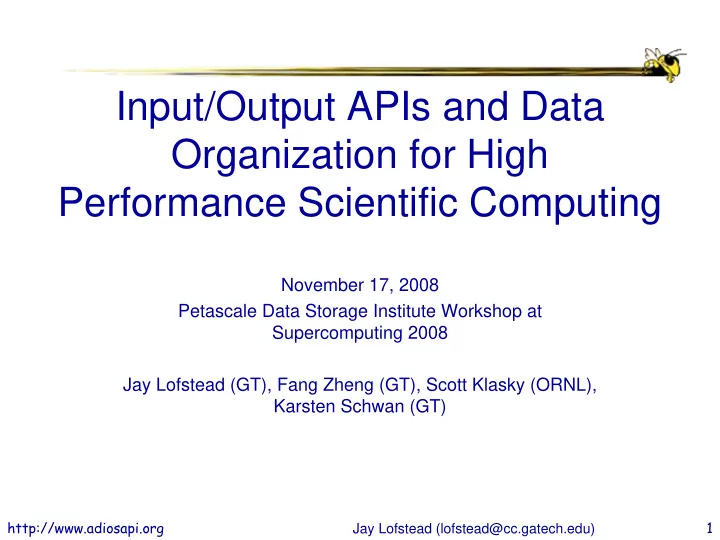

Input/Output APIs and Data Organization for High Performance Scientific Computing November 17, 2008 Petascale Data Storage Institute Workshop at Supercomputing 2008 Jay Lofstead (GT), Fang Zheng (GT), Scott Klasky (ORNL), Karsten Schwan (GT) http://www.adiosapi.org 1 Jay Lofstead (lofstead@cc.gatech.edu)
Overview • Motivation • Architecture • Performance http://www.adiosapi.org 2 Jay Lofstead (lofstead@cc.gatech.edu)
Motivation • Many codes write lots of data, but rarely read • TBs of data • different types and sizes • HDF-5 and pNetCDF used • convenient • tool integration • portable format http://www.adiosapi.org 3 Jay Lofstead (lofstead@cc.gatech.edu)
Performance/Resilience Challenges • pNetCDF • “right sized” header • coordination for each data declaration • data stored as logically described • HDF-5 • b-tree format • coordination for each data declaration • single metadata store vulnerable to corruption. http://www.adiosapi.org 4 Jay Lofstead (lofstead@cc.gatech.edu)
Architecture (ADIOS) • Change IO method by Scientific Codes External changing XML file Metadata (XML file) • Switch between ADIOS API synchronous and buffering schedule feedback asynchronous POSIX IO MPI ‐ IO LIVE/DataTap DART HDF ‐ 5 pnetCDF Viz Engines Others (plug ‐ in) • Hook into other systems like visualization and workflow http://www.adiosapi.org 5 Jay Lofstead (lofstead@cc.gatech.edu)
Architecture (BP) • Individual outputs into “process group” segments • Metadata indices next • Index offsets and version flag at end Process Process Process Process Vars Attributes Index Offsets Group 1 Group 2 ... Group n Group Index Index Index and Version # http://www.adiosapi.org 6 Jay Lofstead (lofstead@cc.gatech.edu)
Resilience Features • Random node failure • timeouts • mark index entries as suspect • Root node failure • scan file to rebuild index • use local size values to find offsets http://www.adiosapi.org 7 Jay Lofstead (lofstead@cc.gatech.edu)
Data Characteristics • Identify file contents efficiently • min/max • local array sizes • Local-only makes it “free” • no communication • Indices for summaries/direct access • copies for resilience http://www.adiosapi.org 8 Jay Lofstead (lofstead@cc.gatech.edu)
Architecture (Strategy) • ADIOS API for flexibility • Use PHDF-5/PNetCDF during development for “correctness” • Use POSIX/MPI-IO methods (BP output format) during production runs for performance http://www.adiosapi.org 9 Jay Lofstead (lofstead@cc.gatech.edu)
Performance Overview • Chimera (supernova) (8192 processes) • relatively small writes (~1 MB per process) • 1400 seconds pHDF-5 vs. 1.4 seconds POSIX (or 10 seconds MPI-IO independent) • GTC (fusion) (29,000 processes) • 25 GB/sec (out of 40 GB/sec theoretical max) writing restarts • 3% of wall clock time spent on IO • > 60 TB of total output http://www.adiosapi.org 10 Jay Lofstead (lofstead@cc.gatech.edu)
Performance Overview • Collecting characteristics unmeasurable • 10, 50, 100 million entry arrays per processes • 128-2048 processes • weak scaling http://www.adiosapi.org 11 Jay Lofstead (lofstead@cc.gatech.edu)
Performance Overview • Data conversion • Chimera 8192 process run took 117 seconds to convert to HDF-5 (compare 1400 seconds to write directly) on a single process • Other tests have shown linear conversion performance with size Parallel conversion will be faster... http://www.adiosapi.org 12 Jay Lofstead (lofstead@cc.gatech.edu)
Summary • Use ADIOS API • selectively choose consistency • BP intermediate format • performance • resilience • later convert to HDF-5/NetCDF Questions? http://www.adiosapi.org 13 Jay Lofstead (lofstead@cc.gatech.edu)
Recommend
More recommend